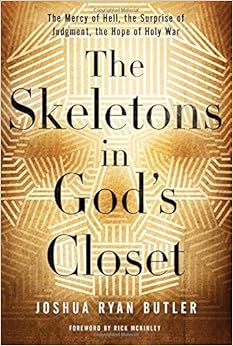A friend of mine has been having some serious doubts about
Christianity and one of the reasons he gives for his doubt is hell. How could a
loving God send people to hell for eternity? If most of us are honest, its hard
for us to reconcile too. When another
friend of mine was raving about Joshua Ryan Butler’s book The Skeletons in God’sCloset (2014), I couldn’t wait to read it.
In Skeletons, Butler takes on three of the hardest questions
that Christians are often faced with and frankly we don’t really know how to
answer with grace and truth. First, how can a loving God send people to hell?
Second, Isn’t it arrogant to believe Jesus is the only way to God? And third,
why is there so much violence in the Old Testament?
 What if Hell, judgment, and holy war are extensions of God’s
love? I believe, with all of my heart that when it says in First John that God
IS love, that John meant it, but I also believe that the Bible does teach about
the reality of hell and that Christ really is the only way to salvation. Butler goes a long way to help his readers to reconcile
these truths.
What if Hell, judgment, and holy war are extensions of God’s
love? I believe, with all of my heart that when it says in First John that God
IS love, that John meant it, but I also believe that the Bible does teach about
the reality of hell and that Christ really is the only way to salvation. Butler goes a long way to help his readers to reconcile
these truths.
Regarding hell, what if God’s purpose is not so much the torture
of the unrepentant, but the protection of his holy city from the destructive
powers of sin? I think that Butler rightly says “sin takes things that are
whole and tries to break them up”—marriages, community, humanity. In restoring the whole, he will not allow the
intrusion of that which destroys.
Butler says that judgment is meant to heal, not destroy the
nations. It is meant to restore relationships, not break them down. Finally, he
describes God as outrageously patient with humanity, but that ultimately he is for his people and he will do whatever
it takes to defend them.
I didn’t like everything about this book, but I liked it. Butler
grounded some of his arguments politically and in ways that I probably wouldn’t
have, but this is a thoughtful, important, scripturally defended book that
deals with some of the most important questions we may face as believers.

No comments:
Post a Comment